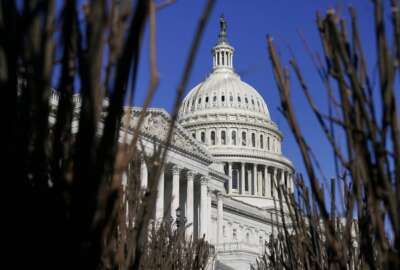Intelligence community whistleblowers finally get a little help, from Congress
Whistleblowers across the government have gotten increasingly more support and protection over the years. Except for those in the secretive intelligence community.
Best listening experience is on Chrome, Firefox or Safari. Subscribe to Federal Drive’s daily audio interviews on Apple Podcasts or PodcastOne.
Whistleblowers across the government have gotten increasingly more support and protection over the years. Except for those in the secretive intelligence community. They have no independent enforcement mechanisms for the protections they do have. Joining the Federal Drive with Tom Temin with how things are about to change, the policy counsel at the Project on Government Oversight, Melissa Wasser.
Interview transcript:
Tom Temin: Ms. Wasser, good to have you on.
Melissa Wasser: Good to be back, Tom.
Tom Temin: And the omnibus appropriations bill looks like it’s going to change the scenes somewhat for IC whistleblowers. Tell us what you’ve discovered.
Melissa Wasser: Absolutely. So there were some strong protections unanimously passed out of the Senate Select Committee on Intelligence that would have gone further to protect IC whistleblowers back with last year’s IAA. However, with today’s drop of the omnibus text, we found that there were some provisions that would change the landscape a little bit for intelligence community whistleblowers. So the good news is it keeps the language from the IAA that creates a consistency of protections for disclosures of mismanagement for both personnel actions and security clearance revocations. It keeps a critical technical correction of the definition of agency to make sure that congressional intent is restored that all intelligence committee whistleblowers can get the protections that they need. Also, it would give the inspector general of the IC community sole authority to determine whether any complaint or information reported to the IG is a matter of urgent concern. However, there were some sections here that were not included in the omnibus.
Tom Temin: OK, well, let’s talk about the ones that were first. How does that improve things for whistleblowers, do you think?
Melissa Wasser: Going first with creating consistency of protections for disclosure of management. Right now, there was a discrepancy in the personnel action statute. They offer protection against retaliation for whistleblowers’ disclosure of mismanagement. However, if you look to the clearance statute, they only offer protection for disclosures of gross mismanagement. So that means, say a whistleblower gets their security clearance revoked in retaliation for reporting mere mismanagement, they have no way to be made whole under statute. So that would create better consistency and ensure that those are given the same weight.
Tom Temin: So therefore, their mismanagement itself is more subject to whistleblowing in effect than it was before.
Melissa Wasser: Correct because not having the gross mismanagement distinction means that if mismanagement is reported, they would be able to be made whole under that statute.
Tom Temin: Right. I only stole money, but I didn’t burn the building down or something. I don’t know what the distinction is. But it sounds like mismanagement. And what about the agency definitions? What is the significance of that?
Melissa Wasser: Sure. So agency coverage under both the personnel action statute, and the clearance statute is inconsistent in scope. And so what it has done has offered protections only to a subset of intelligence community employees and contractors. So currently, protections only apply to people working in agencies that are in an executive agency, a military department and an element of the intelligence community. So any intelligence community elements that aren’t considered military departments are excluded from protection. And so this fix changes that “and” to an “or,” and that means it restores congressional intent to offer protections to all intelligence community whistleblowers.
Tom Temin: All right. And the third change is in the role of the inspector general of the intelligence community.
Melissa Wasser: That’s correct. So I believe it’s Section 502 A in the omnibus, it mirrors text that was found in the Senate’s version in Section 322. That reiterates that an intelligence community inspector general has sole authority to determine whether a whistleblowing disclosure satisfies of what is an urgent concern. Congress initially intended for inspectors general of the intelligence community to have this authority, but there was some controlling guidance from the office of legal counsel that limited that authority a few years ago. And so Congress is trying to correct the impact of that interpretation and restore authority to the IC IG’s.
Tom Temin: We’re speaking with Melissa Wasser. She’s a policy counsel at the project on government oversight. And you said some things for whistleblower protection provisions did not make it into that omnibus agreement, what was left out that you wish had been there?
Melissa Wasser: So unfortunately, there were quite a few things that were left out, again, because we were looking at those Senate fixes out of the Senate Select Committee on Intelligence. A couple things here. First, there’s no language in the omnibus that would create security officers within IG offices that would provide guidance and direction to whistleblowers. You know, currently, intelligence community employees have to alert their agency through their inspector general that they would like to open the lines of communication to Congress. And so that appointment of security officers would have been tasked with giving confidential security related guidance for whistleblowers to navigate their way through this patchwork, right. And so making sure that that that point person was in the agency would have been so important to help whistleblowers make more informed decisions and create an additional layer of independence in that process.
There was also language removed, that would have provided an explicit means for intelligence community employees to make those disclosures directly to Congress. And I’ll mention at the Project on Government Oversight, one of our priorities is ensuring that we can eliminate that prior restraint on IC employees who want to make disclosures to Congress. I think a red flag that did not make it in to the omnibus is dealing with the burden of proof for intelligence community employees fighting these retaliatory clearance actions. And right now, the language that was involved in the SSCI fixes would have established a fair burden of proof for intelligence community employees to come forward. And it would have brought them in line with the burden of proof that federal whistleblowers under Title V has to meet, which requires an agency to prove by clear and convincing evidence that there was a legitimate reason for the adverse security clearance or access to termination. And right now that language is missing. And that’s a missed opportunity for Congress here.
Tom Temin: Got it. So a partial victory here. Do you think that given what was left in and what was left out that whistleblowers are nevertheless somewhat better off in the IC than they were before? Once this is enacted?
Melissa Wasser: I would say they’re somewhat better off. I think having more protections for more employees with that agency definition fix, and ensuring the inspector general’s sole authority is really good. I’ll also mention, too, what’s missing is the entirety of Section 324 from the IAA, which would have added knowing or willful disclosures of a whistleblower’s identity to the list of prohibited personnel practices. Again, another priority for us at POGO is ensuring whistleblower confidentiality, maintaining anonymity is the best way to prevent retaliation before it begins, and not having those protections could really hurt folks and create a chilling effect for people who want to come forward. So on the whole, these are a step in the right direction, in terms of what is in the bill and what is likely to pass because this bill is 1000s of pages long and will have to pass very quickly. And so we’re gonna have to figure out next steps for including those fixes that were not included this time.
Tom Temin: Right. So you’re not done here on this front and trying to get all of these provisions eventually passed so that basically, whistleblowers in the IC would be treated like every other whistleblower in the federal community.
Melissa Wasser: That’s absolutely correct. POGO would not be done fighting for those provisions to be included in future appropriations, future bills and vehicles moving forward in Congress.
Tom Temin: And what about access to the Office of Special Counsel for IC whistleblowers?
Melissa Wasser: So currently, IC whistleblowers don’t have access to OSC. They have very specific channels that they can go through. I don’t think that those were fixes that were included in the IAA version as well. But again, trying to make sure that these intelligence community whistleblowers can come forward, again, there’s a very specific patchwork of laws that they had to navigate and so getting them to parity with other whistleblowers is a key priority for us moving forward.
Tom Temin: Melissa Wasser is a policy counsel at the Project on Government Oversight. Thanks so much for joining me and thanks for a great update.
Melissa Wasser: Thanks so much, Tom, for having me.
Copyright © 2025 Federal News Network. All rights reserved. This website is not intended for users located within the European Economic Area.
Tom Temin is host of the Federal Drive and has been providing insight on federal technology and management issues for more than 30 years.
Follow @tteminWFED






